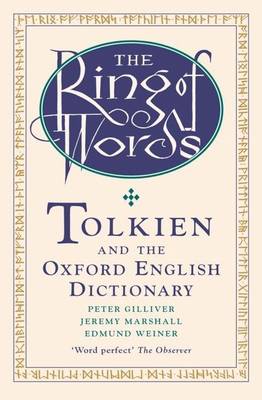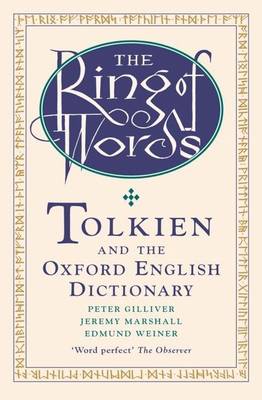
- Afhalen na 1 uur in een winkel met voorraad
- Gratis thuislevering in België vanaf € 30
- Ruim aanbod met 7 miljoen producten
- Afhalen na 1 uur in een winkel met voorraad
- Gratis thuislevering in België vanaf € 30
- Ruim aanbod met 7 miljoen producten
Zoeken
The Ring of Words
Tolkien and the Oxford English Dictionary
Peter Gilliver, Jeremy Marshall, Edmund Weiner
Paperback | Engels
€ 21,95
+ 43 punten
Omschrijving
Tolkien's first job, on returning home from World War I, was as an assistant on the staff of the Oxford English Dictionary. He later said that he had "learned more in those two years than in any other equal part of his life." The Ring of Words reveals how his professional work on the OED influenced Tolkien's creative use of language in his fictional world.
Here three senior editors of the OED offer an intriguing exploration of Tolkien's career as a lexicographer and illuminate his creativity as a word user and word creator. The centerpiece of the book is a wonderful collection of "word studies" which will delight the heart of Ring fans and word lovers everywhere. The editors look at the origin of such Tolkienesque words as "hobbit," "mithril, "Smeagol," "Ent," "halfling," and "worm" (meaning "dragon"). Readers discover that a word such as "mathom" (anything a hobbit had no immediate use for, but was unwilling to throw away) was actually common in Old English, but that "mithril," on the other hand, is a complete invention (and the first "Elven" word to have an entry in the OED). And fans of Harry Potter will be surprised to find that "Dumbledore" (the name of Hogwart's headmaster) was a word used by Tolkien and many others (it is a dialect word meaning "bumblebee").
Few novelists have found so much of their creative inspiration in the shapes and histories of words. Presenting archival material not found anywhere else, The Ring of Words offers a fresh and unexplored angle on the literary achievements of one of the world's most famous and best-loved writers.
Here three senior editors of the OED offer an intriguing exploration of Tolkien's career as a lexicographer and illuminate his creativity as a word user and word creator. The centerpiece of the book is a wonderful collection of "word studies" which will delight the heart of Ring fans and word lovers everywhere. The editors look at the origin of such Tolkienesque words as "hobbit," "mithril, "Smeagol," "Ent," "halfling," and "worm" (meaning "dragon"). Readers discover that a word such as "mathom" (anything a hobbit had no immediate use for, but was unwilling to throw away) was actually common in Old English, but that "mithril," on the other hand, is a complete invention (and the first "Elven" word to have an entry in the OED). And fans of Harry Potter will be surprised to find that "Dumbledore" (the name of Hogwart's headmaster) was a word used by Tolkien and many others (it is a dialect word meaning "bumblebee").
Few novelists have found so much of their creative inspiration in the shapes and histories of words. Presenting archival material not found anywhere else, The Ring of Words offers a fresh and unexplored angle on the literary achievements of one of the world's most famous and best-loved writers.
Specificaties
Betrokkenen
- Auteur(s):
- Uitgeverij:
Inhoud
- Aantal bladzijden:
- 234
- Taal:
- Engels
Eigenschappen
- Productcode (EAN):
- 9780199568369
- Verschijningsdatum:
- 17/08/2009
- Uitvoering:
- Paperback
- Formaat:
- Trade paperback (VS)
- Afmetingen:
- 193 mm x 127 mm
- Gewicht:
- 226 g

Alleen bij Standaard Boekhandel
+ 43 punten op je klantenkaart van Standaard Boekhandel
Beoordelingen
We publiceren alleen reviews die voldoen aan de voorwaarden voor reviews. Bekijk onze voorwaarden voor reviews.








